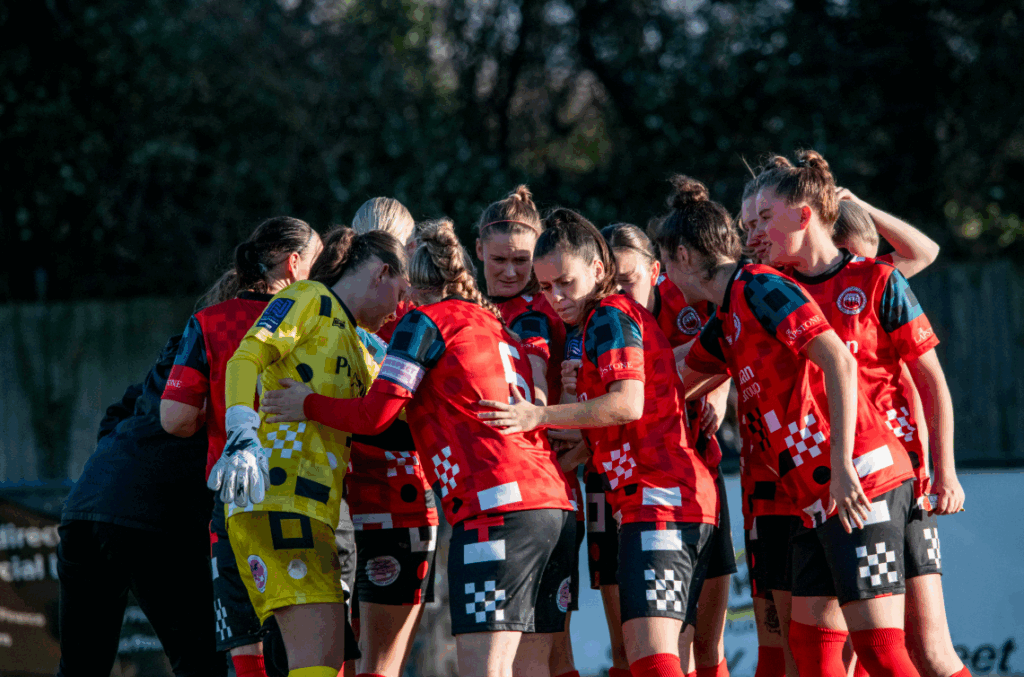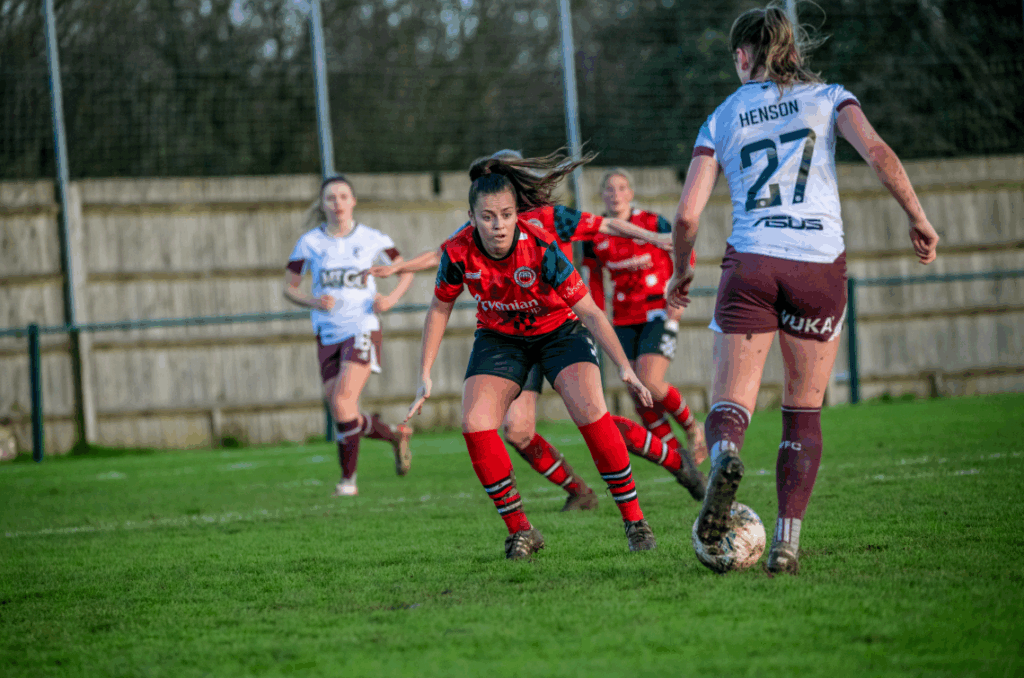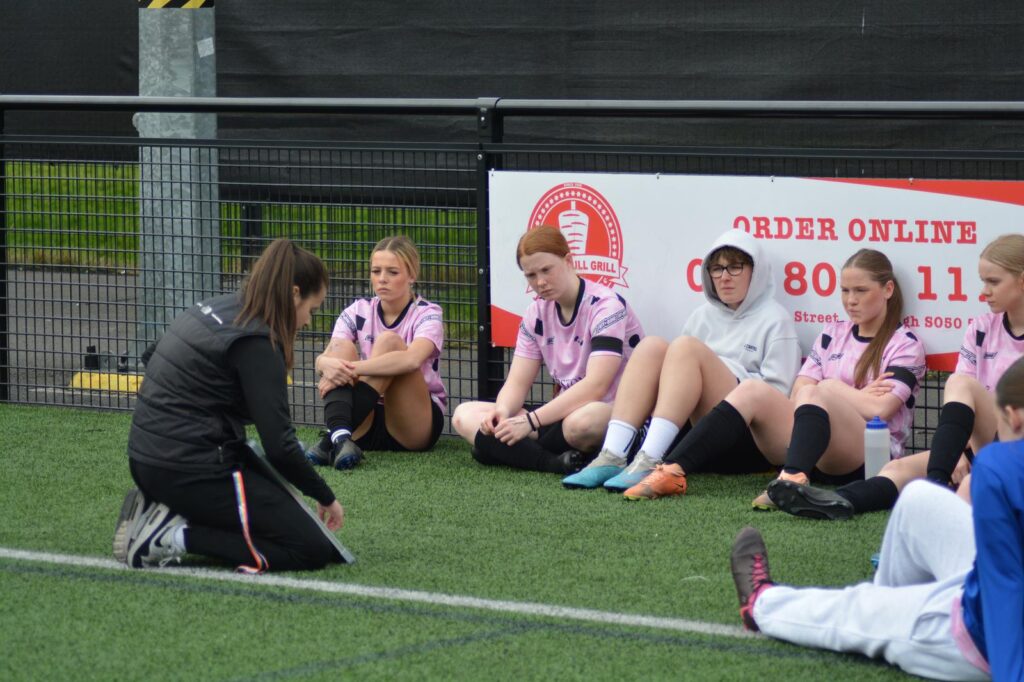“Hello, I’m Emma, and football is a huge part of my life. I play football, I’m a coach, and I teach PE in a Sixth Form College. I also have dyslexia.”
Emma Whitlock is a midfielder for Winchester City Flyers, formerly of Southampton Women’s FC, Southampton FC Women and Southampton Saints. Between the ages of 16 and 18, she attended Itchen Sixth Form College and then studied at Solent University. Whitlock returned to Itchen after graduating, where she now works in the Sports Department as a teacher, and as the Women’s Football Academy’s Head Coach.
Dyslexia: a neurological condition that affects the ease with which a person reads, writes and spells. It is typically recognised as a specific learning disability.
Dyslexia UK reported in 2025 that it is one of the most common learning difficulties, with an estimated 10% of the British population affected by it, and 4% experience severe dyslexia. Diagnosis rates in the UK have increased in recent years due to improved access to assessments, including those able to be conducted online. Therefore, the more communication that there has been around it has led to schools being able to support children, students and parents in recognising the signs earlier and finding ways to manage the difficulties.
However, it’s not only the understanding of written words and processing of language that defines what dyslexia is. The British Dyslexic Association say that it can also affect working memory, processing speed and orthographic skills. It also often co-occurs with other developmental conditions such as ADHD and dyscalculia.
“Dyslexia isn’t something that just pops up now and then because it weaves its way through pretty much everything that I do. Whether I’m in the classroom teaching, out on the pitch coaching, or just balancing home life, dyslexia is always there,” Whitlock said.

Like all other learning disabilities (ADHD, ASD, for example), the school environment and student experience can be a minefield that at times is impossible to navigate.
“School was always a bit of a battleground for me. Memory, spelling, processing speed, getting my thoughts down on paper, and staying focused, were constant struggles for me.
“It wasn’t until Year 9 at school that I started getting some support, but the full dyslexia diagnosis didn’t come until I was at university. Ironically, this was exactly when studying became incredibly demanding, especially trying to juggle it all with my football commitments at Southampton FC, and also working part-time.”
She continued: “The workload felt overwhelming, time management was a nightmare, and simply translating what was in my head onto paper for assignments felt nearly impossible. Playing so much football at that time only amplified the difficulty.”

It was during this period though, that she started to figure out how to navigate those challenges and recognise that dyslexia wasn’t just a certain set of difficulties. Finally having a diagnosis also became a positive: “I began to understand how my brain worked differently.”
Whitlock’s Senior debut came in 2014, when she entered the field for (the now folded) Southampton Saints, making over 60 appearances across three seasons, and she was a part of the team that won the Southampton Divisional FA Cup three times consecutively. She then switched allegiances to Southampton FC in 2017 as the club entered a First Team side into the women’s football pyramid. In her four years at the club, they won back-to-back promotions from the Hampshire County League and Southern Region Premier into the FA Women’s National League.
“When I play football, dyslexia affects me in so many ways. The biggest hurdle is definitely verbal communication and information overload. Complex instructions with multiple steps or just being bombarded with a lot of spoken information at once, can be really tough for me to process and then actually remember.
“It feels like trying to control ten footballs all at the same time, which is chaotic and overwhelming.”
Upon leaving Saints, Whitlock joined her third Southampton team in 2021 to the eight-time FA Cup winning Southampton Women’s FC. She made more than 60 appearances for the Sirens, across three seasons, and was a back-to-back SDFA Cup finalist – Southampton lifted the trophy in 2023 after beating Eastleigh in a penalty shootout.

“My confidence is sometimes knocked. I tend to be quite hard on myself; I can try to be a perfectionist with the things I do.
“I’ve now learned to laugh off some of these situations, but constantly feeling like you’re struggling with things that others find easy can chip away at your self-belief. It makes you feel a bit different sometimes.”
She returned to Itchen whilst working part-time as an assistant in the college’s sports centre. A full-time role was soon attained in the Sports Department, where she now teaches Physical Education.
“A real challenge of mine is dealing with cognitive fatigue. As a teacher, work can be demanding. I’m constantly thinking, talking, and making decisions throughout the day. When I head to football training or an evening match, I’m often already feeling mentally drained, so it can be a real struggle to maintain focus and take in new information.
“I’ve noticed in the past that when I’m completely wiped out from work – especially towards the end of term – and then I go to football, it can really impact my emotions. It can lead to me being disorganised or turning up late because I’ve misplaced my boots or lost my car keys. Anyone who knows me will say that this is an often occurrence!
“Sometimes I feel like my brain just needs to work that little bit harder than everyone else’s in order to get things done, and that can lead to burnout a lot of the time.”
In 2023, Whitlock took on the role of Head Coach of the Women’s Football Academy at Itchen. She mostly oversees the First Team, and since her promotion, the First Team has won the AOC South East Regional League and the Hampshire Colleges Cup against local rivals Barton Peveril.
“Sometimes remembering the names of new players or students can take me longer. You’ll often find me asking for the score during my own matches or when I’m managing my own team, because my head is usually buzzing with a hundred other thoughts.
“I find it really helpful when a coach demonstrates drills in a visual way and does walk-throughs. Being physically involved is even better because it slows everything down to a pace that is more manageable for me to process.”
Similar to Chelsea and Lionesses defender Lucy Bronze’s attitude towards her ASD diagnosis, Whitlock said: “I genuinely believe that sometimes dyslexia can be a bit of a superpower and brings a lot of positives.
“On the pitch, I feel like dyslexia gives me a unique way of seeing the game. I’m very aware of player positioning, how they’re moving and the spaces that are opening up.”
Ahead of the 2024/25 season, Whitlock left the Sirens to join former teammates at Winchester City Flyers in the Southern Region Premier. She continued to explain her dyslexia’s positive impact on her footballing ability: “I often find myself thinking about the pass after the next, almost playing the game a step ahead. I rely heavily on visual cues, reading body language, and anticipating the actions of the opposition.
“It’s like my brain is constantly scanning for visual information, helping me to predict passes and movements based on patterns I’ve observed.”

Through overcoming the hurdles thrown her way, Whitlock has utilised the learning from her challenges to make sure the students she coaches now don’t feel isolated by their differences in understanding. It must be working, when you consider the team’s recent success under her leadership!
“I use a lot of demonstrations and try to come up with creative and easy-to-understand practices for my own players. My thinking is that if it clicks with my own dyslexic brain, then the chances are that it will be clear for everyone else too!”
Whilst statistics, medical definitions and some content from research papers might provide helpful context, getting a full grasp of what dyslexia is all boils down to understanding that no two brains are the same. Learning difficulties and neurological conditions all sit on a spectrum, so two situations can still be experienced in slightly different ways and accommodations required may still be slightly different. One dyslexic individual’s coping mechanism is naturally likely to be different to another’s, and the whole reasoning and purpose behind sharing Whitlock’s experiences can only mean one thing: no-one can explain Emma Whitlock better than Emma Whitlock.
“Ultimately, having coaches, players and people around you who understand and try to support you can make a massive difference to your confidence and ability to understand the information that is being given. Having patience is also a huge factor in helping people with dyslexia.”

The outside perception of neurodivergence from neurotypicals (those without learning difficulties) has the potential to sometimes be destructive. A misleading discourse can develop from it, but keen openness, and indeed giving it a voice and a platform, can make a tremendous difference.
“It can sometimes be difficult for others to fully understand the impact of dyslexia because it isn’t a visible or physical disability. This lack of obvious signs on the outside can sometimes lead to misunderstandings.”
A continuous underlying theme throughout this feature has been the meaning of resilience and determination. The yes, I can attitude that comes from within, and the courage to find those silver linings.
“Having dyslexia has really built my resilience. I’ve had to overcome so many hurdles connected to it, and I truly believe it has made me more resilient both on and off the pitch.”
This feature is part of a collection, titled: Non-visible disabilities in mainstream sport
Feature 1: El Reid | On The Ground
Feature 2: Beth Dobbin | The Things You Don’t See
Feature 3: Elinor Barker | Stay On Track
Feature 4: Matt Graves | Still Human



